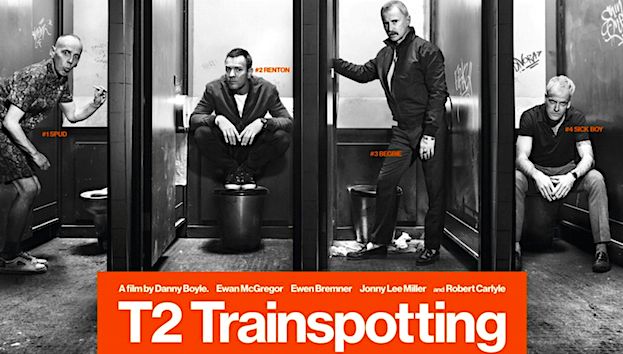MOVIE REVIEW
Trainspotting 2
by Leonard Buschel
Danny Boyle’s Trainspotting is an iconic film of the 1990’s. That isn’t something you can plan in advance. The right film, at the right time, in the right style, becomes a manifestation of both the glory and mystery of cinema.
There is no way of knowing what efforts of experimentation/exploitation will catch “lightning in a bottle” and become more than merely another film at the multiplex. Cinema history spotlights the important, unexpected hits that came out of the blue to command the silver screen and capture a generation’s imagination.
Trainspotting is a rarity, even today. As film critic David Edelstein wrote: “No one before Boyle had combined such zany hijinks with so bleak and grotty a milieu. The young cast was magnetic, the storytelling playful, and the tone closer to American Pie than Drugstore Cowboy.”
Despite the tragic circumstances, gut wrenching addictions, and even a baby dying from parental neglect, patrons came out of the theatre energized and upbeat. Amazing.
Now, twenty years later, comes the sequel: same cast, same director, same cinematic skill and detailed creativity in each image, but it is not an attempt to be the same film nor capture the same attitude. Critical response ranges from overwhelmingly positive (“More fun than a barrel of junkies”) to lukewarm appreciation.
Hey, it’s twenty years later and the exuberant “F-you” attitude of those rowdy youths with the on and off attempts to kick heroin is replaced by middle aged angst, coming to terms with lost youth, and the never-ending propensity for devastation resultant from regarding Heroin as your best friend.
Addiction, while not the centerpiece of the film, plays an omnipresent influence. We know these main characters were all on smack twenty years ago, so where are they now? Spud is still shooting, Sick Boy is snorting coke instead, Renton is clean, and maniacal Digby is just flat out dangerous if not doughy.
With the singular exception of Godfather II, sequels are born to disappoint. Easy Rider, another film with drugs-a-plenty, had a sequel made by a guy in Ohio that never played in theaters, went direct to DVD, and remains virtually unknown. Psycho, the almost abandoned Hitchcock film became an unexpected box-office killer in 1960. It also birthed a sequel twenty year after the original, then Psycho 3, a made for TV Psycho IV, and most recently the popular Bates Motel prequel TV series.
Don’t count on Trainspotting 3. Then again, in twenty years the Rolling Stones may be launching their “Steel Wheelchairs Tour.”


